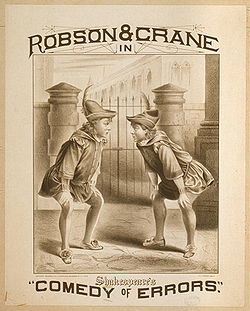The Comedy of Errors
The Comedy of Errors is one of William Shakespeare's early plays. It is his shortest and one of his most farcical comedies, with a major part of the humour coming from slapstick and mistaken identity, in addition to puns and word play. The Comedy of Errors (along with The Tempest) is one of only two of Shakespeare's plays to observe the Unity of Time (classical unities). It has been adapted for opera, stage, screen and musical theatre numerous times worldwide. In the centuries following its premiere, the play's title has entered the popular English lexicon as an idiom for "an event or series of events made ridiculous by the number of errors that were made throughout".
The Comedy of Errors tells the story of two sets of identical twins who were accidentally separated at birth. (Shakespeare was father to one pair of twins.) Antipholus of Syracuse and his servant, Dromio of Syracuse, arrive in Ephesus, which turns out to be the home of their twin brothers, Antipholus of Ephesus and his servant, Dromio of Ephesus. When the Syracusans encounter the friends and families of their twins, a series of wild mishaps based on mistaken identities lead to wrongful beatings, a near-seduction, the arrest of Antipholus of Ephesus, and false accusations of infidelity, theft, madness, and demonic possession.

Text and date
The play is a modernised adaptation of Menaechmi by Plautus. As William Warner's translation of the classical drama was entered into the Register of the Stationers Company on 10 June 1594, published in 1595, and dedicated to Lord Hunsdon, the patron of the Lord Chamberlain's Men, it has been supposed that Shakespeare might have seen the translation in manuscript before it was printed – though it is equally possible that he knew the play in the original Latin, as Plautus was part of the curriculum of grammar school students.
The play contains a topical reference to the wars of succession in France, which would fit any date from 1589 to 1595. Charles Whitworth argues that The Comedy of Errors was written "in the latter part of 1594" on the basis of historical records and textual similarities with other plays Shakespeare wrote around this time. The play was not published until it appeared in the First Folio in 1623.


















0 comments
Sign in or create a free account